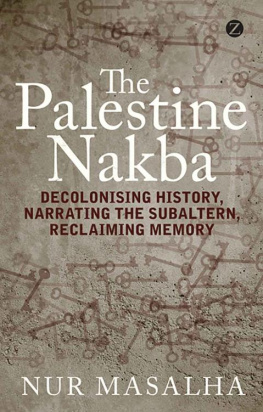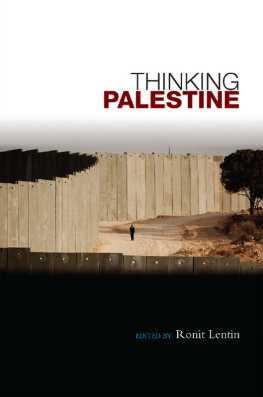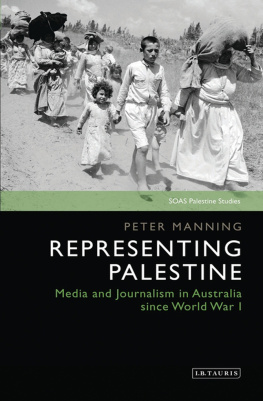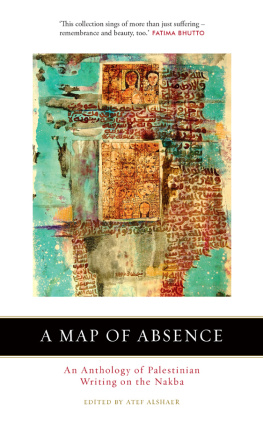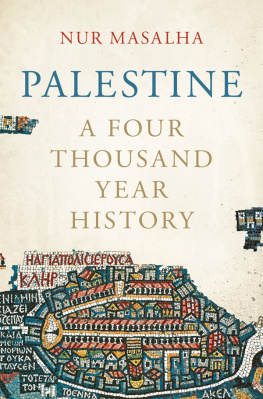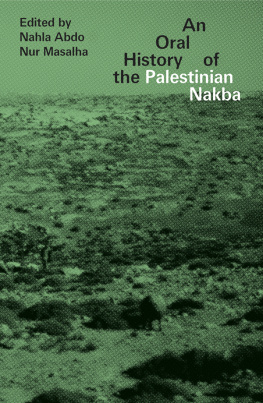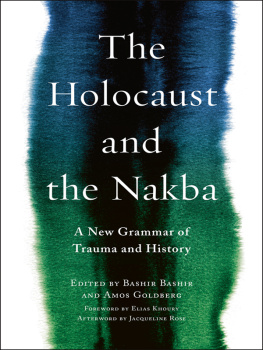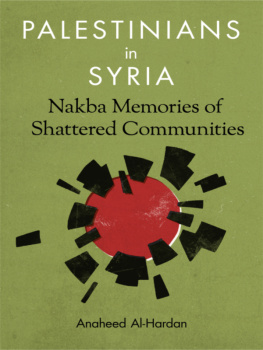About the Author
NUR MASALHA is Professor of Religion and Politics and director of the Centre for Religion and History at St Marys University College, UK. He is also editor of Holy Land Studies: A Multidisciplinary Journal (Edinburgh University Press).
The Palestine Nakba
Decolonising History, Narrating the Subaltern, Reclaiming Memory

NUR MASALHA

The Palestine Nakba: Decolonising History, Narrating the Subaltern, Reclaiming Memory was first published in 2012 by Zed Books Ltd, 7 Cynthia Street, London NI 9JF, UK and Room 400, 175 Fifth Avenue, New York, NY 10010, USA
www.zedbooks.co.uk
Copyright Nur Masalha 2012
The right of Nur Masalha to be identified as the author of this work has been asserted by him in accordance with the Copyright, Designs and Patents Act, 1988
Designed and typeset by illuminati, Grosmont in ITC Bodoni Twelve
Index by John Barker
Cover designed by www.alice-marwick.co.uk
All rights reserved. No part of this publication may be reproduced, stored in a retrieval system or transmitted in any form or by any means, electronic, mechanical, photocopying or otherwise, without the prior permission of Zed Books Ltd.
A catalogue record for this book is available from the British Library Library of Congress Cataloging in Publication Data available
ISBN 978 1 84813 973 2
Contents
Acknowledgements
This book could not have been written without the intellectual and emotional support of my family and friends. First, I would like to thank the many friends and colleagues who have encouraged me over the years and help me, directly and indirectly, with ideas, conversations, criticism, material, logistics and moral support, including Ahmad Sadi, Sherna Berger Gluck, Ilan Papp, Isabelle Humphries, Oren Ben-Dor, Mary Grey, John Docker, Duncan Macpherson, Claire Norton, Mark Donnelly, Ghada Karmi, Ismael Abu-Saad, Seif Dana, David Evans, Sari Hanafi, Saad Chedid, Keith Hammond, Asad Ghanem, Abbas Shiblak, Ronit Lentin, Haim Bresheeth, Rahela Mizrahi, Bernard Regan, Colin South and Sam Kuruvilla. At Zed Books I am particularly indebted to editors Jakob Horstmann and Tamsine ORiordan for their comments and practical help. Last but not least, I owe enormous gratitude to my wife Dr Stephanie Cronin, a highly original historian of the modern Middle East, and my daughter Maryam Masalha for their tremendous enthusiasm and emotional support. Stephanie, in particular, helped me with brilliant ideas and sharp comments without which this volume would not have been completed. Any credit for this book should be shared with Stephanie and the people above, but all shortcomings are mine alone.
Introduction
1948 was the year of the Palestine Nakba (Catastrophe), the uprooting of the Palestinians and the dismemberment and de-Arabisation of historic Palestine. In the course of the 1948 war and immediate post-Nakba period the name Palestine was wiped off the map. In 2012 Palestinians commemorate the 64th anniversary of the Nakba, which is a key date in Palestinian collective memory and the most traumatic event in the history of the Palestinian people. The rupture of 1948 and the ethnic cleansing of Palestine are central to both the Palestinian society of today and Palestinian social history and collective identity. Resisting ethnic cleansing and politicide has been a key feature of the modern history of the Palestinians as a people. In Politicide: Sharons War against the Palestinians (2003), Israeli sociologist Baruch Kimmerling (19392007) defines the politicide of the Palestinian people as the gradual but systematic attempt to cause their annihilation: the dissolution of the Palestinian peoples existence as a legitimate social, political and economic entity. Politicide, Kimmerling asserts, has been present throughout Zionisms struggle with the Palestinians before, during and after the 1948 Nakba. Politicide also epitomised the settler-colonial policies and actions of General Ariel Sharon against the Palestinians. Kimmerling writes:
: 21415)
As : 337). This plan was accompanied by a series of atrocities, of which the massacre of Dayr Yasin in April 1948 is the most notorious. From the territory occupied by Israel in 194849, about 90 per cent of the Palestinians were driven out many by psychological warfare and/or military pressure and a large number at gunpoint. The 1948 war simply provided the opportunity for the creation of an enlarged Jewish state on most of historic Palestine. It concentrated Zionist minds and provided the security, military-strategic and immigrant-settler-demographic explanations and justifications for purging the Jewish state.
The standard Zionist solution for the indigenous inhabitants of the land was predicated on the claim for monopolised Jewish ownership of and Zionist sovereignty over the land of the Bible ().
The Nakba is the turning point in the modern history of Palestine that year over 500 villages: 12).
A society that had existed as far as human memory can go back disappeared during a few months; the homeland, the place of residence, the land a major source of wealth, dignity and influence and the physical and cultural environment, the validity and endurance of which Palestinians had never questioned, turned out to be most insecure. (: 726)
The Nakba, in the words of French theorist of memory Pierra Nora (de mmoire) a site of trauma, dispossession and anger. The two anniversaries of the Nakba Day on 15 May and (since 1976) the Land Day on 30 March are the most important days on the Palestinian popular calendar of commemorations, of strikes, demonstrations, defiance and resistance.
In the words of Israeli revisionist historian Avi Shlaim, the dismantling of Palestinian society in 1948 was a form of war crime, catastrophe and politicide: to deny the Palestinian people any independent political existence in Palestine.: xxxi). Commenting on the post-1948 processes of de-Palestinisation, Palestinian scholar and author of Palestine 1948: LExpulsion (1984) Elias Sanbar observes:
That year, a country and its people disappeared from maps and dictionaries The Palestinian people does not exist, said the new masters, and henceforth the Palestinians would be referred to by general, conveniently vague terms, as either refugees, or in the case of a small minority that had managed to escape the generalized expulsion, Israeli Arabs. A long absence was beginning.
Elias Sanbar is referring to the infamous statement made by Israeli prime minister Golda Meir in 1969 (Meir, who was brought up in the USA and herself migrated to Palestine in 1921, was born in the Ukraine as Golda Mabovitch and was known as Golda Myerson from 1917 to 1956), who denied the existence of the Palestinian people:
There was no such thing as a Palestinian people It was not as though there was a Palestinian people considering itself as a Palestinian people
Meirs statement to the Sunday Times is a classic case of Nakba denial. Sanbar is articulating the exclusion of the Nakba after 1948 not only from Israeli and Western discourses but from some official Arab discourses on Palestine. Upholding the Israeli narrative of denial is still seen in the West as neutral, while anything more critical is seen as biased. Zionism was (and remains) not just about the colonisation of Palestinian land, but also about colonising minds Jewish, Arab, European, American.
Next page
